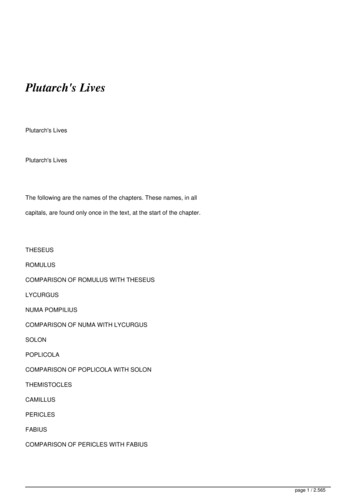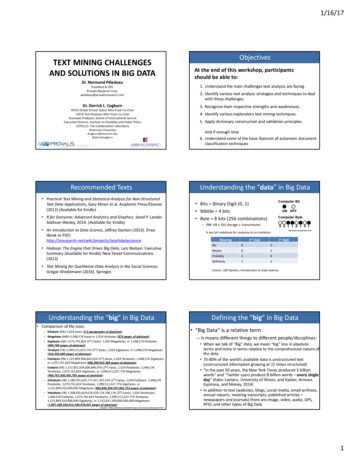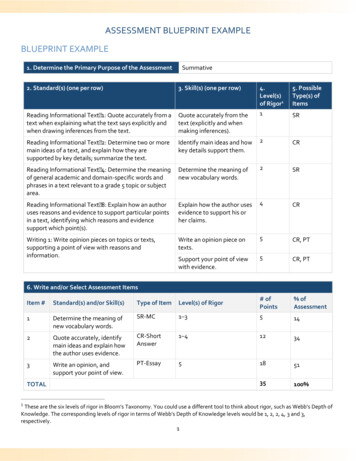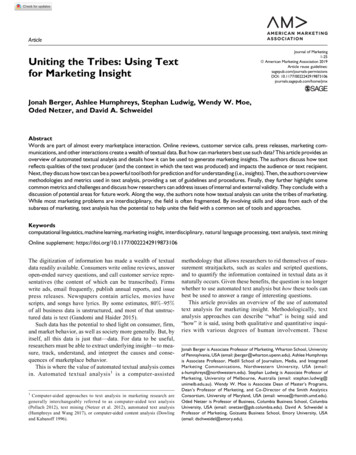
Transcription
Plutarch's LivesPlutarch's LivesPlutarch's LivesThe following are the names of the chapters. These names, in allcapitals, are found only once in the text, at the start of the chapter.THESEUSROMULUSCOMPARISON OF ROMULUS WITH THESEUSLYCURGUSNUMA POMPILIUSCOMPARISON OF NUMA WITH LYCURGUSSOLONPOPLICOLACOMPARISON OF POPLICOLA WITH SOLONTHEMISTOCLESCAMILLUSPERICLESFABIUSCOMPARISON OF PERICLES WITH FABIUSpage 1 / 2.565
ALCIBIADESCORIOLANUSCOMPARISON OF ALCIBIADES WITH CORIOLANUSTIMOLEONAEMILIUS PAULUSCOMPARISON OF TIMOLEON WITH AEMILIUS PAULUSPELOPIDASMARCELLUSCOMPARISION OF PELOPIDAS WITH MARCELLUSARISTIDESMARCUS CATOCOMPARISON OF ARISTIDES WITH MARCUS CATO.PHILOPOEMENFLAMININUSCOMPARISON OF PHILOPOEMEN WITH FLAMININUSPYRRHUSCAIUS MARIUSLYSANDERSYLLACOMPARISON OF LYSANDER WITH SYLLACIMONLUCULLUSCOMPARISON OF LUCULLUS WITH CIMONNICIASCRASSUSCOMPARISON OF CRASSUS WITH NICIASSERTORIUSEUMENESpage 2 / 2.565
COMPARISON OF SERTORIUS WITH EUMENESAGESILAUSPOMPEYCOMPARISON OF POMPEY AND AGESILAUSALEXANDERCAESARPHOCIONCATO THE YOUNGERAGISCLEOMENESTIBERIUS GRACCHUSCAIUS GRACCHUSCOMPARISON OF TIBERIUS AND CAIUS GRACCHUS WITH AGIS AND CLEOMENESDEMOSTHENESCICEROCOMPARISON OF DEMOSTHENES AND CICERODEMETRIUSANTONYCOMPARISON OF DEMETRIUS AND ANTONYDIONMARCUS BRUTUSCOMPARISON OF DION AND BRUTUSARATUSARTAXERXESGALBAOTHOpage 3 / 2.565
Tom s geographers, Sosius, crowd into the edges of their maps parts of theworld which they do not know about, adding notes in the margin to theeffect, that beyond this lies nothing but sandy deserts full of wildbeasts, unapproachable bogs, Scythian ice, or a frozen sea, so, in thiswork of mine, in which I have compared the lives of the greatest menwith one another, after passing through those periods which probablereasoning can reach to and real history find a footing in, I might verywell say of those that are farther off, Beyond this there is nothing butprodigies and fictions, the only inhabitants are the poets and inventorsof fables; there is no credit, or certainty any farther. Yet, afterpublishing an account of Lycurgus the lawgiver and Numa the king, Ithought I might, not without reason, ascend as high as to Romulus, beingbrought by my history so near to his time.Considering therefore with myselfWhom shall I set so great a man to face?Or whom oppose? who's equal to the place?(as Aeschylus expresses it), I found none so fit as him that peopled thebeautiful and far-famed city of Athens, to be set in opposition with thepage 4 / 2.565
father of the invincible and renowned city of Rome. Let us hope thatFable may, in what shall follow, so submit to the purifying processes ofReason as to take the character of exact history. In any case, however,where it shall be found contumaciously slighting credibility, andrefusing to be reduced to anything like probable fact, we shall begthat we may meet with candid readers, and such as will receive withindulgence the stories of antiquity.Theseus seemed to me to resemble Romulus in many particulars. Both ofthem, born out of wedlock and of uncertain parentage, had the repute ofbeing sprung from the gods.Both warriors; that by all the world's allowed.Both of them united with strength of body an equal vigor mind; and ofthe two most famous cities of the world the one built Rome, and theother made Athens be inhabited. Both stand charged with the rape ofwomen; neither of them could avoid domestic misfortunes nor jealousy athome; but towards the close of their lives are both of them said to haveincurred great odium with their countrymen, if, that is, we may take thestories least like poetry as our guide to the truth.The lineage of Theseus, by his father's side, ascends as high as toErechtheus and the first inhabitants of Attica. By his mother's side hewas descended of Pelops. For Pelops was the most powerful of all thekings of Peloponnesus, not so much by the greatness of his riches as thepage 5 / 2.565
multitude of his children, having married many daughters to chief men,and put many sons in places of command in the towns round about him.One of whom named Pittheus, grandfather to Theseus, was governor of thesmall city of the Troezenians, and had the repute of a man of thegreatest knowledge and wisdom of his time; which then, it seems,consisted chiefly in grave maxims, such as the poet Hesiod got his greatfame by, in his book of Works and Days. And, indeed, among these is onethat they ascribe to Pittheus,--Unto a friend sufficeA stipulated price;which, also, Aristotle mentions. And Euripides, by calling Hippolytus "scholar of the holy Pittheus," shows the opinion that the world had ofhim.Aegeus, being desirous of children, and consulting the oracle of Delphi,received the celebrated answer which forbade him the company of anywoman before his return to Athens. But the oracle being so obscure asnot to satisfy him that he was clearly forbid this, he went to Troezen,and communicated to Pittheus the voice of the god,which was in this manner,--Loose not the wine-skin foot, thou chief of men,Until to Athens thou art come again.page 6 / 2.565
Pittheus, therefore, taking advantage from the obscurity of the oracle,prevailed upon him, it is uncertain whether by persuasion or deceit, tolie with his daughter Aethra. Aegeus afterwards, knowing her whom hehad lain with to be Pittheus's daughter, and suspecting her to be withchild by him, left a sword and a pair of shoes, hiding them under agreat stone that had a hollow in it exactly fitting them; and went awaymaking her only privy to it, and commanding her, if she brought forth ason who, when he came to man's estate, should be able to lift up thestone and take away what he had left there, she should send him away tohim with those things with all secrecy, and with injunctions to him asmuch as possible to conceal his journey from every one; for he greatlyfeared the Pallantidae, who were continually mutinying against him, anddespised him for his want of children, they themselves being fiftybrothers, all sons of Pallas.When Aethra was delivered of a son, some say that he was immediatelynamed Theseus, from the tokens which his father had put @ under thestone; others that he received his name afterwards at Athens, whenAegeus acknowledged him for his son. He was brought up under hisgrandfather Pittheus, and had a tutor and attendant set over him namedConnidas, to whom the Athenians, even to this time, the day before thefeast that is dedicated to Theseus, sacrifice a ram, giving this honorto his memory upon much juster grounds than to Silanio and Parrhasius,for making pictures and statues of Theseus. There being then a customfor the Grecian youth, upon their first coming to man's estate, to go toDelphi and offer first-fruits of their hair to the god, Theseus alsopage 7 / 2.565
went thither, and a place there to this day is yet named Thesea, as itis said, from him. He clipped only the fore part of his head, as Homersays the Abantes did.% And this sort of tonsure was from him namedTheseis. The Abantes first used it, not in imitation of the Arabians,as some imagine, nor of the Mysians, but because they were a warlikepeople, and used to close fighting, and above all other nationsaccustomed to engage hand to hand; as Archilochus testifiesin these verses: --Slings shall not whirl, nor many arrows fly,When on the plain the battle joins; but swords,Man against man, the deadly conflict try,As is the practice of Euboea's lordsSkilled with the spear.--Therefore that they might not give their enemies a hold by their hair,they cut it in this manner. They write also that this was the reasonwhy Alexander gave command to his captains that all the beards of theMacedonians should be shaved, as being the readiest hold for an enemy.Aethra for some time concealed the true parentage of Theseus, and areport was given out by Pittheus that he was begotten by Neptune; forthe Troezenians pay Neptune the highest veneration. He is their tutelargod, to him they offer all their first-fruits, and in his honor stamptheir money with a trident.page 8 / 2.565
Theseus displaying not only great strength of body, but equal bravery,and a quickness alike and force of understanding, his mother Aethra,conducting him to the stone, and informing him who was his true father,commanded him to take from thence the tokens that Aegeus had left, andto sail to Athens. He without any difficulty set himself to the stoneand lifted it up; but refused to take his journey by sea, though it wasmuch the safer way, and though his mother and grandfather begged him todo so. For it was at that time very dangerous to go by land on the roadto Athens, no part of it being free from robbers and murderers. Thatage produced a sort of men, in force of hand, and swiftness of foot, andstrength of body, excelling the ordinary rate, and wholly incapable offatigue; making use, however, of these gifts of nature to no good orprofitable purpose for mankind, but rejoicing and priding themselves ininsolence, and taking the benefit of their superior strength in theexercise of inhumanity and cruelty, and in seizing, forcing, andcommitting all manner of outrages upon every thing that fell into theirhands; all respect for others, all justice, they thought, all equity andhumanity, though naturally lauded by common people, either out of wantof courage to commit injuries or fear to receive them, yet no wayconcerned those who were strong enough to win for themselves. Some ofthese, Hercules destroyed and cut off in his passage through thesecountries, but some, escaping his notice while he was passing by, fledand hid themselves, or else were spared by him in contempt of theirabject submission; and after that Hercules fell into misfortune, and,having slain Iphitus, retired to Lydia, and for a long time was thereslave to Omphale, a punishment which he had imposed upon himself for themurder, then, indeed, Lydia enjoyed high peace and security, but inpage 9 / 2.565
Greece and the countries about it the like villanies again revived andbroke out, there being none to repress or chastise them. It wastherefore a very hazardous journey to travel by land from Athens toPeloponnesus; and Pittheus, giving him an exact account of each of theserobbers and villains, their strength, and the cruelty they used to allstrangers, tried to persuade Theseus to go by sea. But he, it seems,had long since been secretly fired by the glory of Hercules, held him inthe highest estimation, and was never more satisfied than in listeningto any that gave an account of him; especially those that had seen him,or had been present at any action or saying of his. So that he wasaltogether in the same state of feeling as, in after ages, Themistocleswas, when he said that he could not sleep for the trophy of Miltiades;entertaining such admiration for the virtue of Hercules, that in thenight his dreams were all of that hero's actions. and in the day acontinual emulation stirred him up to perform the like. Besides, theywere related, being born of cousins-german. For Aethra was daughter ofPittheus, and Alcmena of Lysidice; and Lysidice and Pittheus were brotherand sister, children of Hippodamia and Pelops. He thought it therefore adishonorable thing, and not to be endured, that Hercules should go outeverywhere, and purge both land and sea from wicked men, and he himselfshould fly from the like adventures that actually came in his way;disgracing his reputed father by a mean flight by sea, and not showinghis true one as good evidence of the greatness of his birth by noble andworthy actions, as by the tokens that he brought with him,the shoes and the sword.With this mind and these thoughts, he set forward with a design to dopage 10 / 2.565
injury to nobody, but to repel and revenge himself of all those thatshould offer any. And first of all, in a set combat, he slewPeriphetes, in the neighborhood of Epidaurus, who used a club for hisarms, and from thence had the name of Corynetes, or the club-bearer; whoseized upon him, and forbade him to go forward in his journey. Beingpleased with the club, he took it, and made it his weapon, continuing touse it as Hercules did the lion's skin, on whose shoulders that servedto prove how huge a beast he had killed; and to the same end Theseuscarried about him this club; overcome indeed by him,but now, in his hands, invincible.Passing on further towards the Isthmus of Peloponnesus, he slew Sinnis,often surnamed the Bender of Pines, after the same manner in which hehimself had destroyed many others before. And this he did withouthaving either practiced or ever learnt the art of bending these trees,to show that natural strength is above all art. This Sinnis had adaughter of remarkable beauty and stature, called Perigune, who, whenher father was killed, fled, and was sought after everywhere by Theseus;and coming into a place overgrown with brushwood shrubs, and asparagusthorn, there, in a childlike, innocent manner, prayed and begged them,as if they understood her, to give her shelter, with vows that if sheescaped she would never cut them down nor burn them. But Theseuscalling upon her, and giving her his promise that he would use her withrespect, and offer her no injury, she came forth, and in due time borehim a son, named Melanippus; but afterwards was married to Deioneus, theson of Eurytus, the Oechalian, Theseus himself giving her to him.Ioxus, the son of this Melanippus who was born to Theseus, accompaniedpage 11 / 2.565
Ornytus in the colony that he carried with him into Caria, whence it isa family usage amongst the people called Ioxids, both male and female,never to burn either shrubs or asparagus-thorn,but to respect and honor them.The Crommyonian sow, which they called Phaea, was a savage andformidable wild beast, by no means an enemy to be despised. Theseuskilled her, going out of his way on purpose to meet and engage her, sothat he might not seem to perform all his great exploits out of merenecessity ; being also of opinion that it was the part of a brave man tochastise villainous and wicked men when attacked by them, but to seekout and overcome the more noble wild beasts. Others relate that Phaeawas a woman, a robber full of cruelty and lust, that lived in Crommyon,and had the name of Sow given her from the foulness of her life andmanners, and afterwards was killed by Theseus. He slew also Sciron,upon the borders of Megara, casting him down from the rocks, being, asmost report, a notorious robber of all passengers, and, as others add,accustomed, out of insolence and wantonness, to stretch forth his feetto strangers, commanding them to wash them, and then while they did it,with a kick to send them down the rock into the sea. The writers ofMegara, however, in contradiction to the received report, and, asSimonides expresses it, "fighting with all antiquity," contend thatSciron was neither a robber nor doer of violence, but a punisher of allsuch, and the relative and friend of good and just men; for Aeacus, theysay, was ever esteemed a man of the greatest sanctity of all the Greeks;and Cychreus, the Salaminian, was honored at Athens with divine worship;and the virtues of Peleus and Telamon were not unknown to any one. Nowpage 12 / 2.565
Sciron was son-in-law to Cychreus, father-in-law to Aeacus, andgrandfather to Peleus and Telamon, who were both of them sons of Endeis,the daughter of Sciron and Chariclo; it was not probable, therefore,that the best of men should make these alliances with one who was worst,giving and receiving mutually what was of greatest value and most dearto them. Theseus, by their account, did not slay Sciron in his firstjourney to Athens, but afterwards, when he took Eleusis, a city of theMegarians, having circumvented Diocles, the governor. Such are thecontradictions in this story. In Eleusis he killed Cercyon, theArcadian, in a wrestling match. And going on a little farther, inErineus, he slew Damastes, otherwise called Procrustes, forcing his bodyto the size of his own bed, as he himself was used to do with allstrangers; this he did in imitation of Hercules, who always returnedupon his assailants the same sort of violence that they offered to him;sacrificed Busiris, killed Antaeus in wrestling, and Cycnus in singlecombat, and Termerus by breaking his skull in pieces (whence, they say,comes the proverb of "a Termerian mischief"), for it seems Termeruskilled passengers that he met, by running with his head against them.And so also Theseus proceeded in the punishment of evil men, whounderwent the same violence from him which they had inflicted uponothers, justly suffering after the manner of their own injustice.As he went forward on his journey, and was come as far as the riverCephisus, some of the race of the Phytalidae met him and saluted him,and, upon his desire to use the purifications, then in custom, theyperformed them with all the usual ceremonies, and, having offeredpropitiatory sacrifices to the gods, invited him and entertained him atpage 13 / 2.565
their house, a kindness which, in all his journey hitherto,he had not met.On the eighth day of Cronius, now called Hecatombaeon, he arrived atAthens, where he found the public affairs full of all confusion, anddivided into parties and factions, Aegeus also, and his whole privatefamily, laboring under the same distemper; for Medea, having fled fromCorinth, and promised Aegeus to make him, by her art, capable of havingchildren, was living with him. She first was aware of Theseus, whom asyet Aegeus did not know, and he being in years, full of jealousies andsuspicions, and fearing every thing by reason of the faction that wasthen in the city, she easily persuaded him to kill him by poison at abanquet, to which he was to be invited as a stranger. He, coming to theentertainment, thought it not fit to discover himself at once, but,willing to give his father the occasion of first finding him out, themeat being on the table, he drew his sword as if he designed to cut withit; Aegeus, at once recognizing the token, threw down the cup of poison,and, questioning his son, embraced him, and, having gathered togetherall his citizens, owned him publicly before them, who, on their part,received him gladly for the fame of his greatness and bravery; and it issaid, that when the cup fell, the poison was spilt there where now isthe enclosed space in the Delphinium; for in that place stood Aegeus'shouse, and the figure of Mercury on the east side of the temple iscalled the Mercury of Aegeus's gate.The sons of Pallas, who before were quiet, upon expectation ofrecovering the kingdom after Aegeus's death, who was without issue, aspage 14 / 2.565
soon as Theseus appeared and was acknowledged the successor, highlyresenting that Aegeus first, an adopted son only of Pandion, and not atall related to the family of Erechtheus, should be holding the kingdom,and that after him, Theseus, a visitor and stranger, should be destinedto succeed to it, broke out into open war. And, dividing themselvesinto two companies, one part of them marched openly from Sphettus, withtheir father, against the city, the other, hiding themselves in thevillage of Gargettus, lay in ambush, with a design to set upon the enemyon both sides. They had with them a crier of the township of Agnus,named Leos, who discovered to Theseus all the designs of the PallantidaeHe immediately fell upon those that lay in ambuscade, and cut them alloff; upon tidings of which Pallas and his company fledand were dispersed.From hence they say is derived the custom among the people of thetownship of Pallene to have no marriages or any alliance with the peopleof Agnus, nor to suffer the criers to pronounce in their proclamationsthe words used in all other parts of the country, Acouete Leoi (Hear yepeople), hating the very sound of Leo, because of the treason of Leos.Theseus, longing to be in action, and desirous also to make himselfpopular, left Athens to fight with the bull of Marathon, which did nosmall mischief to the inhabitants of Tetrapolis. And having overcomeit, he brought it alive in triumph through the city, and afterwardssacrificed it to the Delphinian Apollo. The story of Hecale, also, ofher receiving and entertaining Theseus in this expedition, seems to benot altogether void of truth; for the townships round about, meetingpage 15 / 2.565
upon a certain day, used to offer a sacrifice, which they calledHecalesia, to Jupiter Hecaleius, and to pay honor to Hecale, whom, by adiminutive name, they called Hecalene, because she, while entertainingTheseus, who was quite a youth, addressed him, as old people do, withsimilar endearing diminutives; and having made a vow to Jupiter for himas he was going to the fight, that, if he returned in safety, she wouldoffer sacrifices in thanks of it, and dying before he came back, she hadthese honors given her by way of return for her hospitality, by thecommand of Theseus, as Philochorus tells us.Not long after arrived the third time from Crete the collectors of thetribute which the Athenians paid them upon the following occasion.Androgeus having been treacherously murdered in the confines of Attica,not only Minos, his father, put the Athenians to extreme distress by aperpetual war, but the gods also laid waste their country both famineand pestilence lay heavy upon them, and even their rivers were dried up.Being told by the oracle that, if they appeased and reconciled Minos,the anger of the gods would cease and they should enjoy rest from themiseries they labored under, they sent heralds, and with muchsupplication were at last reconciled, entering into an agreement to sendto Crete every nine years a tribute of seven young men and as manyvirgins, as most writers agree in stating; and the most poetical storyadds, that the Minotaur destroyed them, or that, wandering in thelabyrinth, and finding no possible means of getting out, they miserablyended their lives there; and that this Minotaur was(as Euripides hath it)page 16 / 2.565
A mingled form, where two strange shapes combined,And different natures, bull and man, were joined.But Philochorus says that the Cretans will by no means allow the truthof this, but say that the labyrinth was only an ordinary prison, havingno other bad quality but that it secured the prisoners from escaping,and that Minos, having instituted games in honor of Androgeus, gave, asa reward to the victors, these youths, who in the mean time were kept inthe labyrinth; and that the first that overcame in those games was oneof the greatest power and command among them, named Taurus, a man of nomerciful or gentle disposition, who treated the Athenians that were madehis prize in a proud and cruel manner. Also Aristotle himself, in theaccount that he gives of the form of government of the Bottiaeans, ismanifestly of opinion that the youths were not slain by Minos, but spentthe remainder of their days in slavery in Crete; that the Cretans, informer times, to acquit themselves of an ancient vow which they hadmade, were used to send an offering of the first-fruits of their men toDelphi, and that some descendants of these Athenian slaves were mingledwith them and sent amongst them, and, unable to get their living there,removed from thence, first into Italy, and settled about Japygia; fromthence again, that they removed to Thrace, and were named Bottiaeansand that this is the reason why, in a certain sacrifice, the Bottiaeangirls sing a hymn beginning Let us go to Athens. This may show us howdangerous a thing it is to incur the hostility of a city that ismistress of eloquence and song. For Minos was always ill spoken of, andrepresented ever as a very wicked man, in the Athenian theaters; neitherdid Hesiod avail him by calling him "the most royal Minos," nor Homer,page 17 / 2.565
who styles him "Jupiter's familiar friend;" the tragedians got thebetter, and from the vantage ground of the stage showered down obloquyupon him, as a man of cruelty and violence; whereas, in fact, he appearsto have been a king and a lawgiver, and Rhadamanthus a judge under him,administering the statutes that he ordained.Now when the time of the third tribute was come, and the fathers who hadany young men for their sons were to proceed by lot to the choice ofthose that were to be sent, there arose fresh discontents andaccusations against Aegeus among the people, who were full of grief andindignation that he, who was the cause of all their miseries, was theonly person exempt from the punishment; adopting and settling hiskingdom upon a bastard and foreign son, he took no thought, they said,of their destitution and loss, not of bastards, but lawful children.These things sensibly affected Theseus, who, thinking it but just not todisregard, but rather partake of, the sufferings of his fellow citizens,offered himself for one without any lot. All else were struck withadmiration for the nobleness and with love for the goodness of the act;and Aegeus, after prayers and entreaties, finding him inflexible and notto be persuaded, proceeded to the choosing of the rest by lot.Hellanicus, however, tells us that the Athenians did not send the youngmen and virgins by lot, but that Minos himself used to come and make hisown choice, and pitched upon Theseus before all others; according to theconditions agreed upon between them, namely, that the Athenians shouldfurnish them with a ship, and that the young men that were to sail withhim should carry no weapon of war; but that if the Minotaur wasdestroyed, the tribute should cease.page 18 / 2.565
On the two former occasions of the payment of the tribute, entertainingno hopes of safety or return, they sent out the ship with a black sail,as to unavoidable destruction; but now, Theseus encouraging his fatherand speaking greatly of himself, as confident that he should kill theMinotaur, he gave the pilot another sail, which was white, commandinghim, as he returned, if Theseus were safe, to make use of that; but ifnot, to sail with the black one, and to hang out that sign of hismisfortune. Simonides says that the sail which Aegeus delivered to thepilot was not white, butScarlet, in the juicy bloomOf the living oak-tree steeped,and that this was to be the sign of their escape. Phereclus, son ofAmarsyas, according to Simonides, was pilot of the ship. ButPhilochorus says Theseus had sent him by Scirus, from Salamis,Nausithous to be his steersman, and Phaeax his look-out-man in the prow,the Athenians having as yet not applied themselves to navigation; andthat Scirus did this because one of the young men, Menesthes, was hisdaughter's son; and this the chapels of Nausithous and Phaeax, built byTheseus near the temple of Scirus, confirm. He adds, also, that thefeast named Cybernesia was in honor of them. The lotbeing cast, and Theseus having received out of the Prytaneum those uponwhom it fell, he went to the Delphinium, and made an offering for themto Apollo of his suppliant's badge, which was a bough of a consecratedpage 19 / 2.565
olive tree, with white wool tied about it.Having thus performed his devotion, he went to sea, the sixth day ofMunychion, on which day even to this time the Athenians send theirvirgins to the same temple to make supplication to the gods. It isfarther reported that he was commanded by the oracle at Delphi to makeVenus his guide, and to invoke her as the companion and conductress ofhis voyage, and that, as he was sacrificing a she goat to her by theseaside, it was suddenly changed into a he, and for this cause thatgoddess had the name of Epitrapia.When he arrived at Crete, as most of the ancient historians as well aspoets tell us, having a clue of thread given him by Ariadne, who hadfallen in love with him, and being instructed by her how to use it so asto conduct him through the windings of the labyrinth, he escaped out ofit and slew the Minotaur, and sailed back, taking along with him Ariadneand the young Athenian captives. Pherecydes adds that he bored holes inthe bottoms of the Cretan ships to hinder their pursuit. Demon writesthat Taurus, the chief captain of Minos, was slain by Theseus at themouth of the port, in a naval combat, as he was sailing out for Athens.But Philochorus gives us the story thus: That at the setting forth ofthe yearly games by king Minos, Taurus was expected to carry away theprize, as he had done before; and was much grudged the honor. Hischaracter and manners made his power hateful, and he was accusedmoreover of too near familiarity with Pasiphae, for which reason, whenTheseus desired the combat, Minos readily complied. And as it was acustom in Crete that the women also should be admitted to the sight ofpage 20 / 2.565
these games, Ariadne, being present, was struck with admiration of themanly beauty of Theseus, and the vigor and address which he showed inthe combat, overcoming all that encountered with him. Minos, too, beingextremely pleased with him, especially because he had overthrown anddisgraced Taurus, voluntarily gave up the young captives to Theseus, andremitted the tribute to the Athenians. Clidemus gives an accountpeculiar to himself, very ambitiously, and beginning a great way back:That it was a decree consented to by all Greece, that no vessel from anyplace, containing above five persons, should be permitted to sail, Jasononly excepted, who was made captain of the great ship Argo, to sailabout and scour the sea of pirates. But Daedalus having escaped fromCrete, and flying by sea to Athens, Minos, contrary to this decree,pursued him with his ships of war, was forced by a storm upon Sicily,and there ended his life. After his decease, Deucalion, his son,desiring a quarrel with the Athenians, sent to them, demanding that theyshould deliver up Daedalus to him, threatening, upon their refusal, toput to death all the young Athenians whom his father had received ashostages fr
effect, that beyond this lies nothing but sandy deserts full of wild beasts, unapproachable bogs, Scythian ice, or a frozen sea, so, in this work of mine, in which I have compared the lives of the greatest men with one another, after passing through those periods which probable reasoning can










